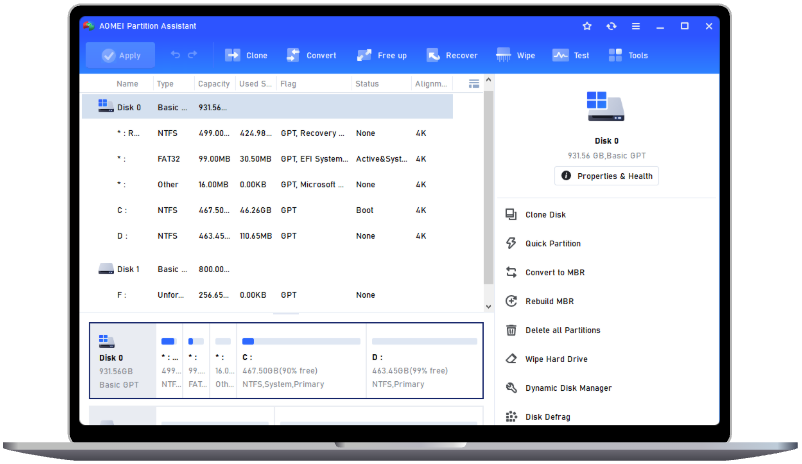Best Software to Hot Clone in Windows 11, 10, 8, 7
What is hot clone? You will find the detailed instruction to hot clone in this article and learn a safe way to perform hot clone in Windows 11, 10, 8, 7.
What is hot clone?
Hot clone, also called online clone, or live clone, allows you to clone the system when your OS is still running no matter on a physical or virtual machine. That is to say, your workflow won't be forcibly interrupted or shut down, making you don't have to wait until the clone process finishes. This helps you save time and energy.
The only problem is brought by its merits: you are able to make the operations on your computer even the hot clone process is ongoing. Therefore, the new changes during this process will not be included to clone target.
Which one is better: hot clone or cold clone?
Opposite to hot clone, cold clone is another method of cloning, which doesn't allow you to use your computer unless the clone process stops. How long it will take to clone a drive depends on how much your system data is.
Contrasting the two clone approaches, hot clone wins in the aspect of high efficiency and productivity. If possible, hot cloning your system is a better choice.
Why need to hot clone?
We have known the promising aspect of hot clone, but why do we need to hot clone? What benefits can be brought through cloning or copying system? Actually, it's a good decision to clone system if you find you are in the two following conditions:
▶ Keep your system safe: By cloning your system, you can get a duplicate of your current system data. Thus, you can restore your system or reboot from the cloned disk if some system errors like EFI partition is raw happen in the future.
▶ Optimize your OS performance: You can migrate your current OS to a larger disk or a new SSD (solid state drive) without reinstallation to improve the speed of hard drive to get better performance.
Best software to hot clone in Windows 11, 10, 8, 7?
As a matter of fact, any operation on system needs strict requirements to prevent any accidental errors. That's the main reason why you'd better choose a professional OS cloning software like AOMEI Partition Assistant Professional to perform hot clone safely. As long as you are Windows 11/10/8/7 (64 bit and 32 bit) users, whether you are running on a physical machine or a virtual machine, you can download this software which provides two methods to help you either back up your system for security or advance your system speed.
▷ Method 1. Disk Clone Wizard
This function will clone the entire disk not only including OS partition like C partition or Recovery partition but also other partitions on the old disk to a new internal or external hard drive.
Step 1. Install and open AOMEI Partition Assistant Professional. Click "Clone" in the main interface, and select "Clone Disk".
Step 2. Choose the hard disk that you need to clone as the source disk and click "Next".
Step 3. Select another drive as the destination disk, and then click "Next".
Step 4. Then, you can check the source and destination disk in the next window or change to "Sector to Sector clone", and click the "Confirm" button to continue if there is no problem.
Here, you can also click the "Settings" button to adjust the partition size on the destination disk or tick "4k alignment" to improve the reading and writing speed of the SSD.
✿ Copy without resizing partitions: The source disk configuration will be copied on the new disk with the same partitions size.
✿ Fit partitions to the entire disk: The partitions on the source disk will occupy the entire destination disk.
✿ Edit partitions on this disk: It allows you to adjust the size of the partition manually, and change the size as you like.
Step 5. After returning to the main interface, check the pending operation and click "Apply" and "Proceed" to commit the operation.
▷ Method 2. Migrate OS to HDD/SSD
This feature will only copy Windows 11/10/8/7 OS to HDD or SSD with other partitions unrelated to operating system remaining on the old hard drive. And the migration is available between MBR disk and GPT HDD/SSD and vice versa.
Step 1. In the main interface of AOMEI Partition Assistant Professional. Click “Clone” on in the top toolbar, and choose “Migrate OS” and click "Next" in the pop-out window.
Step 2. Choose an unallocated space on the new drive. If there are partitions on it, you will find the Next button is grayed out, just tick "I want to delete all partitions..." to get unallocated space and click then "Next" to continue.
Step 3. In the new window, you can resize partition as you need, then click "Next".
Step 4. Read the note carefully and click "Finish".
Step 5. Click "Apply" and "Proceed" to commit the operation.
Notes:
1. After you have cloned Windows OS to a new SSD successfully, you can change the boot order in BIOS menu to boot from the cloned SSD next time. By the way, you can wipe old hard drive as a data disk.
2. If you have cloned Windows OS from MBR disk to GPT or from MBR to GPT, you are required to change the boot mode from BIOS to UEFI, or UEFI to BIOS respectively.
Conclusion
As we can see, hot clone has obvious advantages over cold clone especially in cloning system. If you have the needs to duplicate your system, don’t hesitate to choose a reliable software like AOMEI Partition Assistant Professional recommended above to perform hot clone on Windows 11, 10, 8, 7 in a secure way. Moreover, you can enjoy more powerful functions in this software: move installed programs to another drive, convert system disk between MBR and GPT disk, and so on.
Plus, if you are Server users, please try AOMEI Partition Assistant Server.


